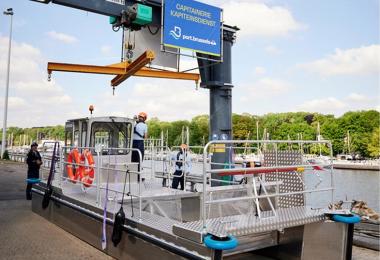4
Reduce the amount of litter such as food packaging on the ground in public spaces
Measures
13. Installing and maintaining enough public litter bins and other street furniture relating to public cleanliness, choosing whichever model is best suited to the intended use.
Optimising the maintenance and installation of public litter bins and other street furniture relating to urban cleanliness, and defining the models to be recommended in the Brussels-Capital Region according to how public spaces are used. The possibility of using a regional purchasing centre for potentially interested municipalities will be studied.
14. Starting in 2022, studying the feasibility conditions for introducing a deposit scheme for plastic bottles and cans in Belgium, in collaboration with the Walloon and Flemish Regions.
From 2022 onwards, studying the feasibility conditions for introducing a deposit system for plastic bottles and drinks cans in Belgium, in collaboration with the Walloon and Flemish Regions and with reference to the General Policy Declaration of the Brussels-Capital Region, which states that ‘the Government will take the initiative with a view to setting up a deposit system for drinks cans and plastic bottles’. It will be necessary to analyse the environmental (including urban cleanliness), economic, technical and even social impacts of implementing this in the Brussels-Capital Region and in Belgium.
15. Communicating about alternatives to single-use food packaging and promoting their use by distributing water flasks or reusable containers.
Intensifying communication about alternatives to single-use food packaging, with a view to reducing litter, in particular by promoting reusable water flasks and containers, for example during events and weekly markets.
16. Combating litter (packaging, cigarette butts, bulky items, etc.) thrown into our ponds, rivers, canal, sewers, etc. by means of infrastructure, the reintroduction of plant life to aquatic environments, awareness-raising along the lines of ‘The sea begins here’ and clean-up actions.
Dealing with the presence of litter – i.e. food and consumer packaging, cigarette butts and even bulky items – in aquatic environments (ponds, rivers, the Brussels canal, etc.), in the sewerage network and in wastewater treatment plants, by establishing and improving specific infrastructure, carrying out studies with a view to limiting floating waste, restoring vegetation in aquatic environments thanks in particular to floating islands, clean-up projects using cleaning boats, awareness-raising initiatives for target audiences on the importance of protecting water, particularly in urban areas, due to its role in supporting the environment (such as the ‘The sea begins here’ campaign).
The vessel, named the Damona, is the first electric, zero-emission boat to be acquired by the Port of Brussels. It joins the Castor (2006) and the Botia (2019), the two other cleaning boats that have been active in the port for several years. It was launched on 2 June 2022, boosting the equipment used by the Port of Brussels to improve the cleanliness of the 80 hectares of water represented by 14 kilometres of canal in the Brussels-Capital Region.
At present, the cleaning boats go out almost every day depending on personnel availability, unless weather conditions prevent them from doing so. Between 200 and 250 m3 of waste are collected in this way every year.
An initiative of the Port of Brussels

